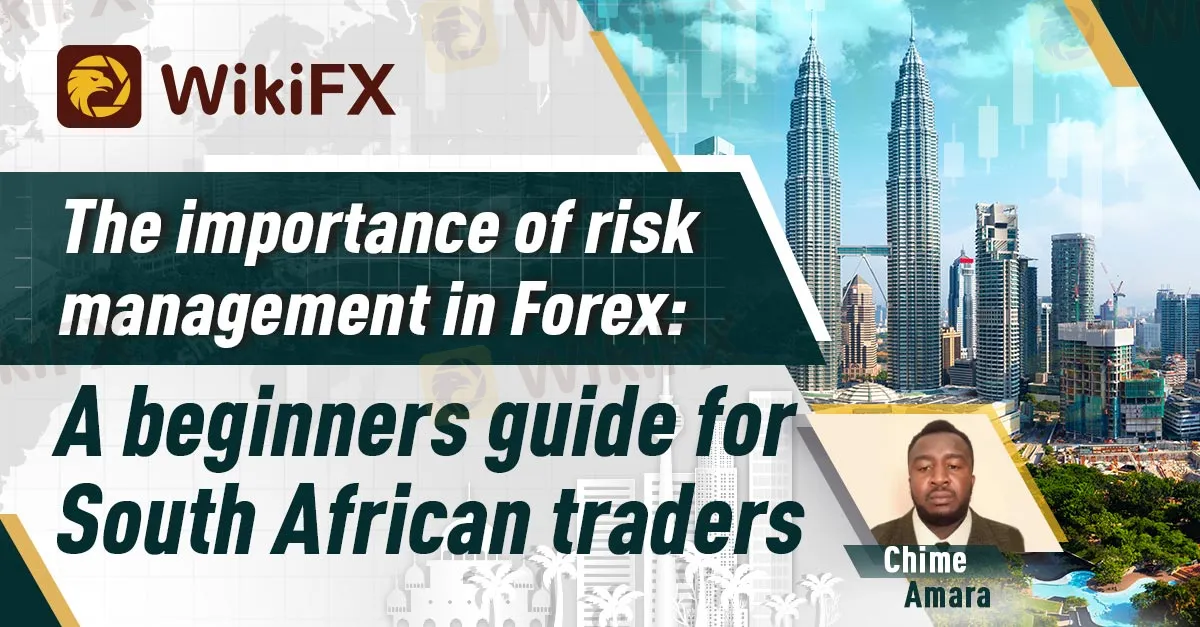简体中文
繁體中文
English
Pусский
日本語
ภาษาไทย
Tiếng Việt
Bahasa Indonesia
Español
हिन्दी
Filippiiniläinen
Français
Deutsch
Português
Türkçe
한국어
العربية
The importance of risk management in Forex: A beginner’s guide for South African traders
Abstract:The quest to make quick profits from the market has often led some traders to neglect the need for applying proper risk management practices while taking any positions in the market. Some traders tend to trust so much in the accuracy of their analysis and predictions that they neglect that the market can as well disappoint. The outcome of this negligence is always unbearable and often, had resulted in such traders losing their entire capital. Proper risk management practices remain the best way for guarding against loss and remaining profitable in the forex market today.

By: Chime Amara

What is Risk management?
Risk management is the practice of guarding against excessive loss by protecting one's position should the market go contrary to the trader's predictions.
What are the risk management practices?
There are basically four major risk management practices obtainable in forex trading. We have discussed them below.
A. Use of Stop loss: Stop loss is an important risk management practice that involves setting a pending order below or above one's position to close one's open position should the market take the opposite course of the trader's forecast. Often a Stop loss order is set 30 - 50 pips away from one's entry. Some prefer mapping out only 1% of their capital as the stop loss target.
B. Setting take-profit target: The fact that the market often spiked to hit certain levels and then reverse from it, has made it very necessary for traders to set their targets for each position they take in the market today. Setting a take-profit order helps to close one's trades when the market gets to the indicated level.
C. Correct use of Lotsize: Lotsize is the buying power due to each trader based on his capital. One of the greatest means through which traders can manage their risk well is by choosing the correct lotsize due to their capital. Using excessive lotsizes endangers the trader's capital in cases where the market goes against him.
D. Hedging: Hedging involves taking two different positions at the same time in the market as a way of guarding against loss. Here the trader often placed a new trade above or below his stoploss to be triggered in cases when the market reverses and cuts off his stop loss target. Similarly, hedging includes but is not limited to taking two opposite positions at the same time.
Conclusion
The importance of risk management practice in forex trading can never be overemphasized. Thus, without proper risk management practice put in place, the trader is all the more exposed to losing a greater part of his capital due to high market volatility. It is therefore necessary for all forex traders to apply proper risk management practice while taking any positions in the market today.

Disclaimer:
The views in this article only represent the author's personal views, and do not constitute investment advice on this platform. This platform does not guarantee the accuracy, completeness and timeliness of the information in the article, and will not be liable for any loss caused by the use of or reliance on the information in the article.
Read more

These forex trading strategies can help you make money
The profit of forex trading may look attractive, but it will cost you a lot if you don’t know any trading strategies. Here are some beginner-friendly forex trading strategies that can help you build your confidence—and hopefully your profits—as you navigate the forex market.

ASIC cancels AFS licences of Ipraxis and Downunder Insurance Services
The Australian Securities and Investments Commission (ASIC) has cancelled the Australian Financial Services (AFS) licences of two financial services provider companies due to unpaid industry funding levies; They are Downunder Insurance Services Ltd and Ipraxis Pty Ltd.

CFI Financial Group Becomes Official Online Trading Partner of Etihad Arena
CFI Financial Group is now the Official Online Trading Partner of Etihad Arena, marking a significant expansion into Abu Dhabis thriving entertainment scene.

What WikiFX Found When It Looked Into BCR
In the complex world of online trading, verified licenses and confirmed operational presence offer important reference points for evaluating a broker. BCR is one such firm that has undergone regulatory registration and address verification.
WikiFX Broker
Latest News
Capital.com Strengthens UK FinTech Ties with Key Memberships
10-year Treasury yield ticks higher as investors eye jobs report
Elon Musk's xAI raises $10 billion in debt and equity as it steps up challenge to OpenAI
Crypto Craze Fizzling Out? Here is Why
Public companies bought more bitcoin than ETFs did for the third quarter in a row
Stock futures are flat after investors sell tech names to start the second half of 2025: Live updates
Social Trading Goes Mobile at M4Markets
ACY Securities Expands Crypto CFD Offering with 24/7 Trading Access
Revelation: Makeup Artist, Social Media Influencer Involved in INR 1.62 Cr Forex Trading Scam
European Central Bank's tightening cycle is done,' chief economist says
Currency Calculator


